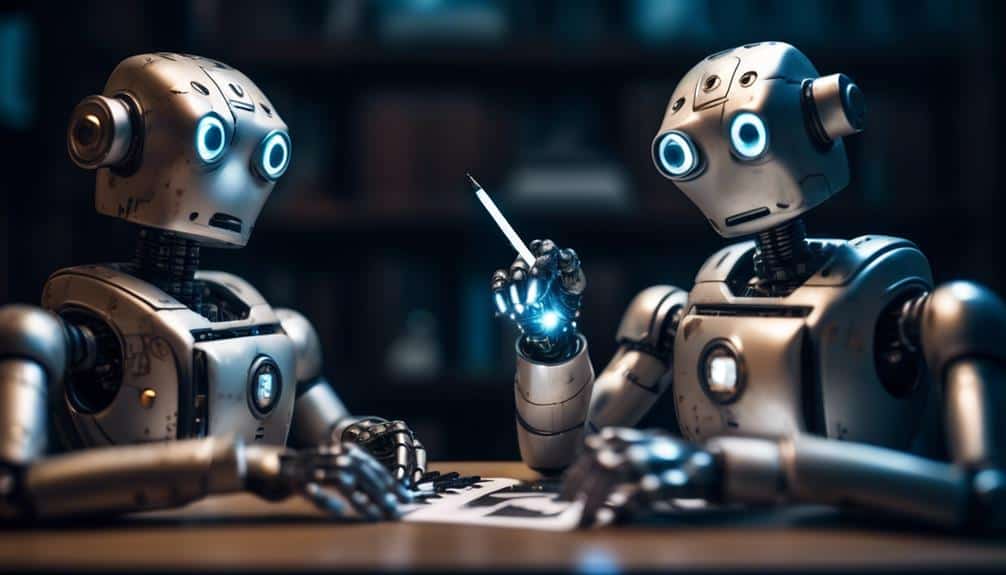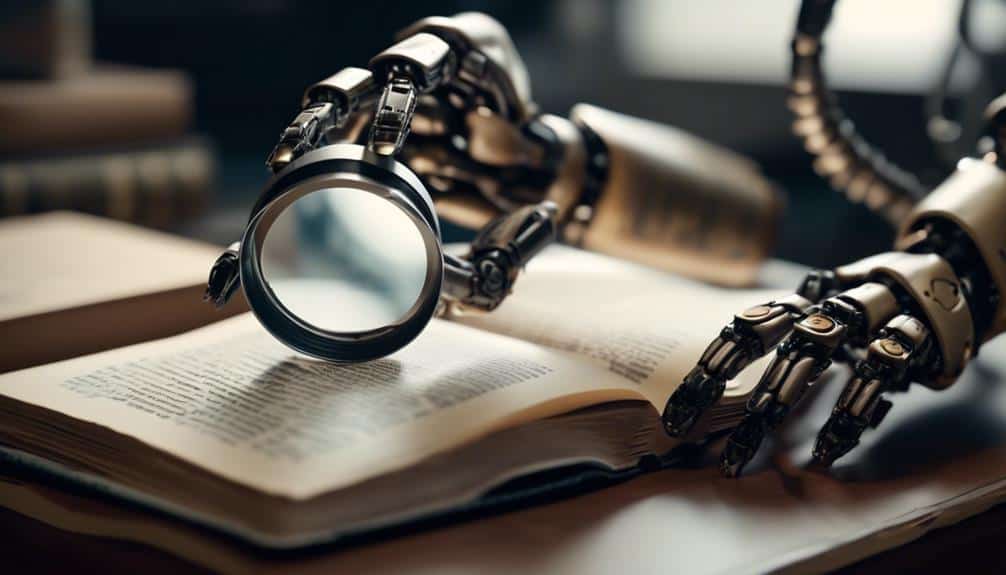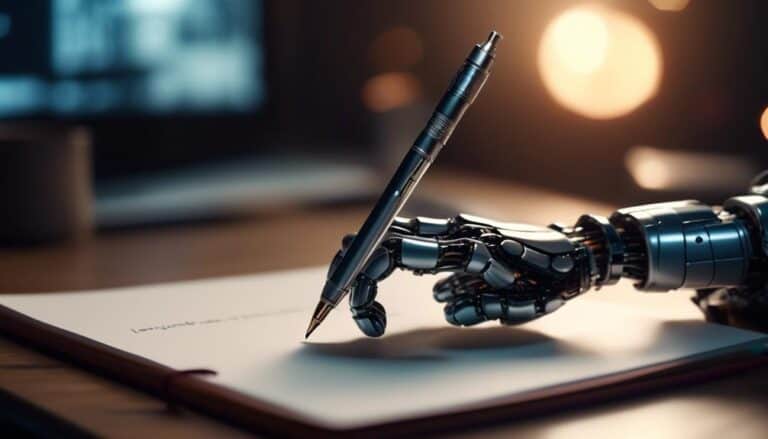The Ethics of AI Authorship: Addressing Plagiarism in the Age of Machines
In the realm of AI-generated content, the old adage 'with great power comes great responsibility' holds a significant weight as we navigate the landscape of AI authorship and plagiarism.
As technology advances and AI becomes more adept at creating content, the ethical considerations surrounding AI-generated texts and potential plagiarism issues come to the forefront. The intersection of artificial intelligence and authorship raises complex questions about ownership, originality, and intellectual property.
As we delve into the intricacies of this evolving field, exploring the ethical implications and potential solutions becomes imperative for fostering a responsible and sustainable future.
Key Takeaways
- Ethical considerations in AI content creation are crucial to address dilemmas and ensure responsible use of AI in authorship.
- AI plagiarism detection faces challenges such as bias, which can be overcome through leveraging NLP and continuous algorithm refinement.
- Clear guidelines and responsibilities need to be established for both human and AI authors to combat plagiarism and promote ethical standards.
- The future impact of AI in writing includes aiding creativity, respecting intellectual property rights, and monitoring ethical AI usage to maintain trust in content creation.
The Rise of AI in Content Creation

The integration of artificial intelligence (AI) technologies into content creation processes has revolutionized the way information is generated and disseminated. AI-generated creativity presents a paradigm shift, challenging traditional notions of authorship and creativity. Ethical considerations arise as AI systems blur the lines between human and machine contributions in content creation. It's crucial to address the ethical implications of AI-generated content, particularly concerning plagiarism and intellectual property rights.
When considering AI-generated creativity, ethical dilemmas may surface regarding the ownership of content. As AI systems autonomously generate text, images, or music, questions arise about who should be credited as the creator. Ensuring proper attribution and addressing issues of plagiarism become paramount in this new landscape. Moreover, the potential for AI to replicate existing works raises concerns about originality and the protection of intellectual property.
In navigating the rise of AI in content creation, it's imperative to uphold ethical standards that safeguard the rights of creators while embracing the innovative possibilities AI offers. Balancing AI's capabilities with ethical considerations is essential to foster a creative environment that respects both human ingenuity and technological advancements.
Understanding AI-Generated Texts
AI-generated texts challenge conventional notions of authorship and creativity, prompting a reevaluation of intellectual property rights in the digital era. When exploring AI-generated creativity, it's essential to consider the ethical implications surrounding the development and use of such technology.
Ethical considerations arise in understanding AI-generated texts due to the blurred lines between human and machine authorship. Questions about who should own the rights to AI-generated content, the responsibilities of developers in ensuring the ethical use of AI, and the potential impact on traditional creative industries all come into play.
As AI continues to advance in generating sophisticated texts, it becomes crucial to establish clear guidelines and regulations to address these ethical dilemmas. Striking a balance between fostering innovation and protecting the rights of human creators is paramount in navigating the evolving landscape of AI-generated creativity. By delving into these ethical considerations, we can better shape the future of authorship and creativity in the age of machines.
Detecting AI Plagiarism: Challenges

Detecting AI plagiarism presents unique challenges that require innovative solutions.
AI plagiarism detection methods must evolve to keep pace with the sophistication of AI-generated content.
Overcoming AI bias and ensuring ethical implications are addressed remain crucial aspects in the fight against AI plagiarism.
AI Plagiarism Detection Methods
In the realm of academic integrity and technological advancements, grappling with the proliferation of AI-generated content raises critical questions surrounding the ethical complexities of plagiarism detection methods. Natural language processing (NLP) and machine learning algorithms have revolutionized how plagiarism is detected in the era of AI.
NLP enables systems to comprehend the nuances of human language, aiding in the identification of similarities between texts. Machine learning algorithms play a pivotal role in analyzing vast amounts of data to uncover patterns indicative of plagiarism. However, challenges persist, such as the need for continuous algorithm refinement to keep pace with evolving AI capabilities.
Striking a balance between innovation and ethical considerations remains crucial in ensuring the integrity of academic work in the face of AI advancements.
Overcoming AI Bias
To combat the inherent biases present in AI systems utilized for plagiarism detection, a meticulous approach to algorithm development and validation is imperative. Bias mitigation in AI algorithms is crucial to ensure fair representation in AI text generation. When developing these algorithms, it's essential to consider the potential biases that may be inadvertently incorporated into the system. By actively working to identify and address these biases, you can enhance the overall integrity and fairness of AI-powered plagiarism detection tools. Implementing measures for bias mitigation can lead to more accurate and reliable detection of plagiarism while promoting ethical practices in the realm of AI authorship.
| Challenges in Overcoming AI Bias | Strategies for Bias Mitigation | Impact on Plagiarism Detection |
|---|---|---|
| Lack of Diversity in Training Data | Diversifying training datasets | Enhanced accuracy and fairness |
| Pre-existing Biases in AI Models | Regular bias audits | Improved reliability of detection |
| Interpretation of Contextual Nuances | Context-aware algorithms | Better understanding of text similarities |
| Ethical Implications | Ethical guidelines integration | Ensuring ethical AI practices |
Ethical Implications Addressed
Addressing the ethical implications associated with AI plagiarism detection requires a thorough examination of the challenges inherent in maintaining integrity and fairness within automated authorship systems. Ethical considerations are paramount when implementing AI algorithms for plagiarism detection.
One significant challenge lies in ensuring that machine learning models are trained to distinguish between genuine creative expression and mere replication. This distinction is crucial in avoiding false accusations of plagiarism that could harm the reputation and credibility of authors. Additionally, the complexity of human language and the nuances of writing styles present obstacles in accurately detecting instances of plagiarism.
Striking a balance between protecting intellectual property rights and fostering innovation while upholding ethical standards remains a delicate task in the realm of AI-powered plagiarism detection.
Legal Implications of AI Content

When exploring the legal implications of AI content, it's crucial to consider how artificial intelligence intersects with existing copyright laws. AI-generated content raises questions about ownership, attribution, and the role of plagiarism detection tools in upholding intellectual property rights.
As technology advances, the legal landscape must adapt to ensure fair and ethical treatment of AI-generated works within the realm of copyright and intellectual property law.
AI and Copyright Laws
In the realm of AI and copyright laws, the rapid advancements in technology pose complex challenges regarding the ownership and protection of AI-generated content. With the proliferation of AI and machine learning systems producing creative works, questions surrounding intellectual property rights have become more pressing.
Copyright laws were primarily designed to protect the creative output of human authors, but as AI becomes more sophisticated, it blurs the lines of authorship. The current legal framework struggles to keep pace with the capabilities of AI, leading to uncertainties about who owns AI-generated content.
As we navigate this evolving landscape, it's crucial to reevaluate copyright laws to ensure fair and equitable protection for both human creators and AI systems.
Plagiarism Detection Tools
Plagiarism detection tools play a crucial role in navigating the legal implications of AI-generated content, ensuring integrity and accountability in the digital landscape. These tools leverage machine learning and algorithmic analysis to scrutinize vast amounts of data, identifying similarities and anomalies that indicate potential plagiarism. Their significance lies in upholding ethical standards and protecting intellectual property rights in an era where AI can create content autonomously.
By employing cutting-edge technology, plagiarism detection tools not only detect copied content but also aid in educating users about proper citation practices and ethical writing. Ultimately, these tools serve as a safeguard against plagiarism, promoting originality and honesty in the digital realm.
- Leveraging machine learning
- Enhancing algorithmic analysis
- Upholding ethical standards
- Educating users
Ethics in AI Authorship
Navigating the ethical landscape of AI authorship requires a nuanced understanding of the complex interplay between machine-generated content and intellectual integrity. When considering AI ethics, accountability becomes a crucial aspect to uphold. Fair AI practices must be rooted in transparency to ensure that the content produced is ethically sound and respects intellectual property rights. As AI continues to evolve, it is essential to establish guidelines that prioritize ethical considerations in the realm of AI authorship.
| Ethical Considerations in AI Authorship | Description |
|---|---|
| AI Ethics | Ensuring ethical use of AI in content creation. |
| Accountability | Holding creators responsible for AI-generated work. |
| Fair AI Practices | Implementing just and unbiased AI algorithms. |
Strategies to Combat AI Plagiarism

Establishing robust mechanisms to combat AI plagiarism is imperative for upholding the ethical integrity of machine-generated content creation. When dealing with AI-generated content, it's essential to implement effective strategies to prevent plagiarism.
Here are some key approaches to combat AI plagiarism:
- Utilize Advanced Algorithms: Employ advanced algorithms that can detect similarities between AI-generated content and existing works, flagging potential instances of plagiarism.
- Regularly Update Databases: Maintain up-to-date databases of known sources and references to cross-reference AI-generated content and identify any unauthorized duplication.
- Implement Ethical Guidelines: Develop and enforce strict ethical guidelines for AI content creation, emphasizing the importance of originality and proper citation practices.
- Educate AI Developers: Provide training and education to AI developers on plagiarism prevention strategies, encouraging responsible AI content generation practices.
The Future of AI Writing
In envisioning the future landscape of AI writing, embracing innovative technologies and ethical frameworks will be paramount for shaping the trajectory of machine-generated content creation. As AI continues to advance, its impact on creativity and ethical considerations must be carefully monitored to ensure the responsible use of this technology.
| Impact on Creativity | Ethical Considerations |
|---|---|
| AI can assist in generating new ideas quickly, potentially enhancing creativity. | Ensuring AI-generated content respects intellectual property rights and does not plagiarize existing works is crucial. |
| Automation of certain writing tasks may free up time for human writers to focus on more complex and creative aspects of their work. | Transparent disclosure to audiences about AI involvement in content creation is essential to maintain trust and authenticity. |
Frequently Asked Questions
How Do Ai-Generated Texts Impact the Job Market for Human Writers?
AI-generated texts can lead to job displacement for human writers. However, embracing creative collaboration between AI and humans can enhance content creation, offering new opportunities for innovation and synergy in the evolving landscape of writing.
Are There Any Cases Where AI Plagiarism Has Resulted in Legal Action?
In some instances, AI plagiarism has led to legal action, highlighting the need for AI accountability. The implications of AI-generated content on copyright and intellectual property laws are evolving, raising questions about responsibility and regulation.
Can Ai-Generated Content Be Protected Under Intellectual Property Laws?
Yes, AI-generated content can be protected under intellectual property laws. Copyright protection applies to original works, including those created by AI. However, fair use exceptions may arise when using AI-generated content for specific purposes.
What Are the Potential Implications of Ai-Generated Content on Academic Integrity?
When considering academic fraud, AI technology introduces complex ethical considerations. The potential implications of AI-generated content on academic integrity raise concerns about authenticity, attribution, and the responsibility of creators in the digital age.
How Do Cultural and Societal Biases Influence Ai-Generated Texts and Plagiarism Detection Algorithms?
Cultural influences shape AI-generated texts, affecting bias detection in plagiarism algorithms. Society's norms and values seep into these systems, impacting accuracy. Stay vigilant in recognizing and addressing these biases to uphold integrity in content creation and detection.
Conclusion
As AI continues to revolutionize content creation, the ethical implications of plagiarism in the age of machines can't be ignored. Detecting and combating AI-generated plagiarism poses unique challenges, but it's essential to uphold the integrity of authorship in the digital era.
By implementing strategies to address AI plagiarism and considering the ethical implications of AI authorship, we can ensure that the future of writing remains rooted in honesty, integrity, and respect for originality.








